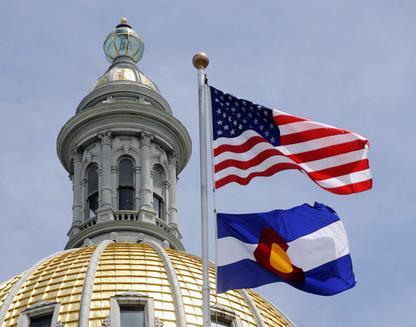What is House Bill 1187?
HB1187 would allow the government budgets at all levels to grow much larger each year by changing the current growth formula of the Taxpayer’s Bill of Rights. The current automatic increase uses the previous year’s budget and adds the growth in population plus inflation.[1] Under the existing formula, Colorado’s State budget has grown an average of 4.7 percent a year for the past 25 years that TABOR has been in effect.
The new formula would replace the growth rate with the growth in personal income, averaged over five years. With that substitution, the TABOR limit would soar.
The measure is sponsored by Rep. Dan Thurlow (R-Grand Junction) and Sen. Larry Crowder (R-Alamosa County).
A fatal flaw in the proposal.
This bill is a very sneaky effort to avoid the constitutional rules altogether. The rules say that the state constitution cannot be changed by passing a law. This proposed measure says it can change a foundational definition in the constitution with a new law. It does not ask simply for the state to keep the excess of taxes collected for some number of years. It is a permanent change in how each TABOR limit is set. That’s a fundamental change to the constitution.
Although the bill would be referred to the voters for approval, the way it intends to get to the ballot is unconstitutional. The correct way is to go through a House or Senate Concurrent Resolution, which requires a 2/3 vote in each body before the amendment can be referred to the voters. The proponents know they could not earn that much support, so they intend to ignore the rules.
By pretending that they can change Referendum C language, the sponsors want voters to think it’s only a “modest” change to statute. That’s not playing by the rules and it is dishonest and deceptive. Even for those who want to see governments get more money, they should oppose this measure because no politician should flout the method we have all agreed to use for fundamental, constitutional changes.
The State budget has been allowed to grow by almost 5 percent a year, so why is more needed?
Good question. The result of HB 1187 going into effect would mean a huge tax increase for people. The request ignores the balance needed between government taxes and healthy family budgets. It expects that families bear a bigger burden. At the state level alone, the government would be able to keep over $400 million in just the first two years by hanging on to excess collections. The growth rate compounds and compounds forever, so the new formula would push the revenue and spending limits so high as eventually to be meaningless.
HB 1187 is intended to boost taxes at all levels of government, capturing a larger proportion of the economy for bigger, more intrusive government.
It is unlikely citizens would ever see a rebate of over-collected taxes again. Using the experience of the past 25 years, the State budget would grow at about 6 percent a year, and instead of doubling every 15 years, the budget would double about every 12 years.
What should citizens know?
HB 1187 has already been voted out of the House Finance Committee. It will wind its way through the House and probably pass, because it has support from the Democratic majority in the House.
Assuming the bill makes it to the Senate, opponents can hope that the measure is assigned to a committee that will take a harder, more thorough and jaundiced inspection. Where the bill is sent is up to Senate President Kevin Grantham. If it gets through a Senate committee, it’s likely to pass because it also has a Senate Republican sponsor who would form a majority with the likely unanimous support of the Democratic bloc. It would become a Referred measure on the November 7, 2017 ballot.
You can have a say on the progress of the bill. If the bill goes to the Senate, you may testify on it in the Senate Committee. You may also let Senate President Kevin Grantham know about your position and ask him to refer it to the best committee; his phone number is 303.866.4877 and his email is kevin.grantham.senate@state.co.us
Check out www.theTABORfoundation.org for more information.
[1] This is a simplification; a shorthand. There is a more relevant adjustment for school districts to reflect growth in enrollment, and a more relevant adjustment for local governments.

Leave a Reply